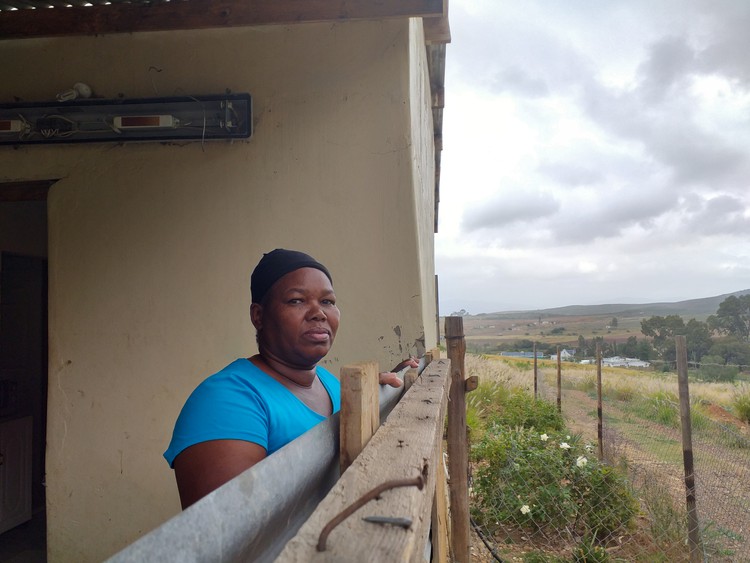
Katrina Zwanota won her case at the CCMA in March but faces eviction from her home. Photo: Barbara Maregele
26 June 2019
“I ran the guesthouse like it was my own place for 15 years … Now I’m unemployed and soon to be homeless,” says Katrina Zwanota, the former manager of theLAB Lifestyle guesthouse outside Robertson, Western Cape.
Zwanota is one of 12 employees who have accused the company of unfair dismissal. They say they were dismissed so that the company could hire cheaper labour. Zwanota and her family have also been given notice to vacate their home, which is situated on the farm, by 1 July.
According to its website, theLAB Lifestyle has guesthouses in Robertson, Franschhoek and Hout Bay which offer a “a world first” experience by using “voice-controlled smart home solutions” around the property. The guesthouses offer “high-tech room automation”, solar heating, and a “state of the art” cinema. Guests are invited to “have fun and ask theLAB by voice command to ‘make a cup of coffee’, ‘turn on the TV’, ‘close the blinds’, ‘start a shower’, ‘set the alarm’ and ‘turn off the lights’”. Prices range from R800 to R2,100 per night.
Zwanota, 52, has been working at what was then the Rosendal Wellness Retreat since 2004. She says her troubles began in September 2018, when Josh Balk, owner of theLAB, bought the property.
In a letter dated 2 October 2018, seen by GroundUp, the previous owner Gier Tellefsen told Zwanota that her contract had been transferred to Balk. The letter stated that her employment under the new owners would be “on the whole no less favourable to the terms and conditions of employment with Rosendal” and that the “recognition of service” would remain unchanged. “Your remuneration including the value of any perks will be equal to that which you currently receive”, she was told.
But Zwanota says without consulting her Balk started deducting R2,000 from her salary for rent. She had previously paid R250 per month. She says she had used her own money to improve her house, which had no electricity or hot water. “Why would he increase the rent so much?”
Dereck Hirson of theLAB denied that her rent had been increased.
Zwanota says she was also taken to work at the guesthouse in Hout Bay, in spite of her reluctance. “I was there for two weeks. I complained because as the manager I worked from 7am until 11pm with no breaks,” she says.
“I was told that if I go back to Robertson, there is no job for me,” she says.
A few weeks after returning home, on 18 February, Zwanota says she was told not to return to work and that her family should vacate the house. She challenged her “unfair dismissal” at the Commission for Conciliation, Mediation and Arbitration (CCMA) and won her case in March. She was awarded a R10,000 settlement but is yet to receive the money. “I was told I will only get the money, minus the rent, when I move out,” she says.
Zwanota is now unemployed and struggling to find another job in the town.
Katrina Peterse worked for the company for six years. “I started doing laundry and worked my way up to be the evening chef,” she says.
Peterse, who is eight months pregnant, says she was dismissed in May for “failing to report for duty”. She spent two days in hospital in April and was put on two days bed rest to stop her from going into premature labour. When she returned to work the next week she was informed she no longer had a job and was only paid half of her salary at the end of the month. She challenged her “unfair dismissal” at the CCMA.
In its ruling on 20 June, the CCMA said the company had disputed Peterse’s version, and referred her to the Labour Court.
Three other employees have also taken their case to the CCMA. Katrina Arendse, Jasmine Tromp and Colene Baardman were told in January that the company no longer had work for them. According to the CCMA document, the company told the commissioner that it was downsizing and had retrenched the employees.
But because the three women were not consulted or informed prior to this, the commissioner ruled in favour of the women in May, finding the company’s actions to be “procedurally unfair.” The company was ordered to pay Arendse and Tromp R16,000 each, and Baardman R8,000.
Malizo Kwinana of the Commercial, Stevedoring, Agricultural and Allied Workers Union (CSAAWU) has been assisting Zwanota and the other employees. He said the company’s refusal to pay Zwanota’s award in full is unlawful. “The unfair dismissal matter and the eviction are separate things. He needs to pay her money and then go to the courts for an order if he wants to evict her,” he said.
Kwinana said that because Zwanota was living on the farm, the Extension of Security of Tenure Act of 1997 should apply. This means the company would have to apply to the court for an eviction order.
On Tuesday, Kwinana said they were preparing to take Peterse’s case to the Labour Court.
In response to detailed questions from GroundUp, Hirson said, “We are going through formal processes with these former employees. We consider these both personal and confidential. We have gone through due processes and the employees have been engaged on it.”
He said “work hours and duties have all been agreed on with mutual consent”.
Asked whether any steps were in place to evict Zwanota and her family, Hirson said, “This matter has been discussed and agreed with Ms Zwanota as part of the process both parties were engaged in.”
Hirson added that when they bought the guesthouse, it had to be renovated to build something new and different. “Unfortunately, we had to make some difficult decisions,” he said.